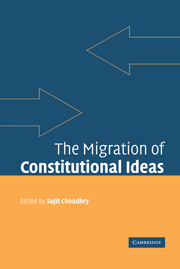Book contents
- Frontmatter
- Contents
- List of contributors
- Acknowledgements
- 1 Migration as a new metaphor in comparative constitutional law
- PART I The methodology of comparativism
- PART II Convergence toward a liberal democratic model?
- PART III Comparative constitutional law, international law and transnational governance
- PART IV Comparative constitutional law in action – constitutionalism post 9/11
- 13 The migration of anti-constitutional ideas: the post-9/11 globalization of public law and the international state of emergency
- 14 The post-9/11 migration of Britain's Terrorism Act 2000
- 15 ‘Control systems’ and the migration of anomalies
- Index
13 - The migration of anti-constitutional ideas: the post-9/11 globalization of public law and the international state of emergency
Published online by Cambridge University Press: 25 July 2009
- Frontmatter
- Contents
- List of contributors
- Acknowledgements
- 1 Migration as a new metaphor in comparative constitutional law
- PART I The methodology of comparativism
- PART II Convergence toward a liberal democratic model?
- PART III Comparative constitutional law, international law and transnational governance
- PART IV Comparative constitutional law in action – constitutionalism post 9/11
- 13 The migration of anti-constitutional ideas: the post-9/11 globalization of public law and the international state of emergency
- 14 The post-9/11 migration of Britain's Terrorism Act 2000
- 15 ‘Control systems’ and the migration of anomalies
- Index
Summary
In this book, we collectively retire the idea of ‘constitutional borrowing’ and put in its place the idea of ‘constitutional migration’. Metaphors matter in shaping thought, and so it is crucial to get the metaphors right for highlighting key features of the matter under discussion. And ‘migration’ gives us tools to think with that ‘borrowing’ cannot. After all, constitutional ideas migrate back and forth across international boundaries, like other transnational flows. Borrowing implies something far more rigidly organized.
Nonetheless, the metaphor of borrowing is still the most commonly used image in the field of comparative constitutional law. The prevalence of the idea of ‘borrowing’ has brought with it a sense that there are national stocks of constitutional knowledge that are lent out in a neighbourly way like cups of sugar from house to house. But the borrowing metaphor seems patently misleading as a description of the way that constitutional ideas actually move in transnational legal space. First, ideas are not ‘borrowed’ with the implicit promise that they will be returned. Then, constitutional constructions are not owned in the way that ‘borrowing’ implies, with use of the object temporarily given to a non-owner while the real owner retains certain superior rights. Finally, the idea of ‘borrowing’ always signals that something positive is being transferred without alteration, which takes attention away from the cases in which one country draws negative implications from another country's experience or from the cases in which ideas are irredeemably altered as they move.
- Type
- Chapter
- Information
- The Migration of Constitutional Ideas , pp. 347 - 373Publisher: Cambridge University PressPrint publication year: 2007
- 8
- Cited by



